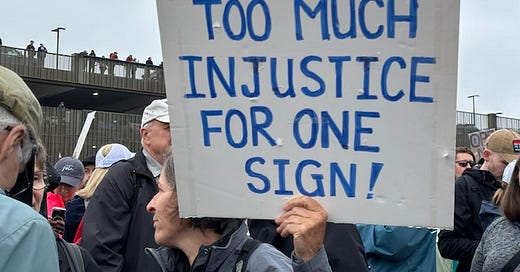I was on my way from the library to the coffee shop at Brandeis on November 22, 1963 when I noticed people parked along the side of the road with their car doors open and their radios blasting. Kennedy had been shot. Like 9/11 thirty-eight years later which, like all of us, I watched in real time on TV, these were world-historical events that set up shop in our consciousness and never went out of business. They became part of our blood chemistry, a big part of who we are. June 14, 2025 may have that impact on me even though the headlines are not quite as big and I am new to Minnesota and even newer to any understanding of the players in Minnesota politics.
We had just arrived last Saturday at the St. Paul College parking lot where the No Kings march to the Capitol was convening. Mid-morning, the weather was gray and cool. I had arrived at the event with a new friend from Mayim Rabim synagogue who was kind enough to drive me. The two of us were scoping out the crowd and leaning in to hear the march leaders who were giving instructions from the bed of a truck fitted out with a sound system. Out of nowhere, a young woman ran up yelling “Melissa Hortman has been assassinated. Melissa Hortman has been assassinated.” I didn’t know who Melissa Hortman was but the word “assassinated” buried me like an avalanche, like something terrible that I couldn’t escape. It was the kind of feeling you have in bad dreams, in nightmares when you’re being pursued by a monster. You can’t get away and you don’t exactly know what you’re trying to escape. Soon after, there was an announcement from the truck bed. The program of speakers at the Capitol which was set to include Gov. Walz as well as the Lieutenant Governor and the Attorney General, all prominent Democrats and friends of the murdered former Speaker, would not take place but the march would go on. We will march, she said, and we began moving towards the Capitol dome a half mile in the distance. Worried people were already texting me from various parts of the country, but in that crowd, estimated at 30,000 people, I did not feel afraid. There were handmade signs, there was chanting, and most wonderfully there was a brass band with trumpets, trombones, saxophones and drums. It felt like a funeral in New Orleans, all grief and joy mixed together.
Two days later, Frank and I went to the Jewish Community Center in St. Louis Park to see an art exhibit about dreams that included work by another new friend. The JCC features a gallery where the work of community creative artists is on display in a quiet, contemplative space. But to get inside the JCC, you have to insert your driver’s license into a card reader. I passed an armed guard in the hallway. It reminded me of the shock of seeing a tank parked outside of the synagogue in Rome after a car bomb exploded in front of the JCC in Buenos Aires in the 1990s. There are good dreams and there are bad dreams and there is reality, a fierce amalgam of the two.
What can we bring to reality in these very hard times? What do we humans have in our bag of tricks that makes no sense, that can’t be explained, that answers no questions but that we all know is essential to our survival. Much is being written lately about hope, its audacity and its necessity. Krista Tippett asks “What makes you feel despair?” and “What makes you feel hope?” I tried to respond without second-guessing myself. Despair, I thought, is what I feel when people don’t seem to care and hope is what I feel when people do. They are two sides of the same coin. It’s a coin that shines when people celebrate their commonality and grows dull when they narrow their field of vision down to what serves them, enriches them, promotes them and their kind. I thought of the intergenerational energy of the No Kings march. In particular, I remembered a young woman, all beads and nose rings, who confided that it was her first protest. I noticed the tenderness I felt towards her, this stranger in the street, and I knew that that tenderness was an expression of hope and that she had gotten under my thick skin and changed me.
*********************************************************************************************************
Many Voices will now accept contributions from all subscribers. At this critical time, we need to hear what everyone has to say. Please let me know if you have work that you would like to send to seventysomething for our Many Voices feature. Make your voice heard. Write to me at seventysomething9@gmail.com.
Please consider upgrading to a paid subscription to support seventysomething and have access to the archives. Your ideas are always welcome.
*************************************************************************************************************
Copies of my 2019 essay collection, Twilight Time: Aging in Amazement, are available directly from me (signed) or from your local bookseller.






As a Canadian, I felt utterly thrilled, moved, inspired by the reporting and photos of the No Kings marches all over the country. Thank you, Susie, for bringing us (with your wonderful writing) to be with you in Minnesota. May the rivers of people marching with hope ultimately drown the evil so currently present.
Always just the right read, thank you. I think capitalism with a capital C has undermined our commonality by making each of us an individual consumer who is also meant to bear the entirety of our experience as if we are here alone (e.g., any health issues must be ours not all of ours). Hope and despair as two sides of the same coin, yes--this coin is always rolling around here, too.